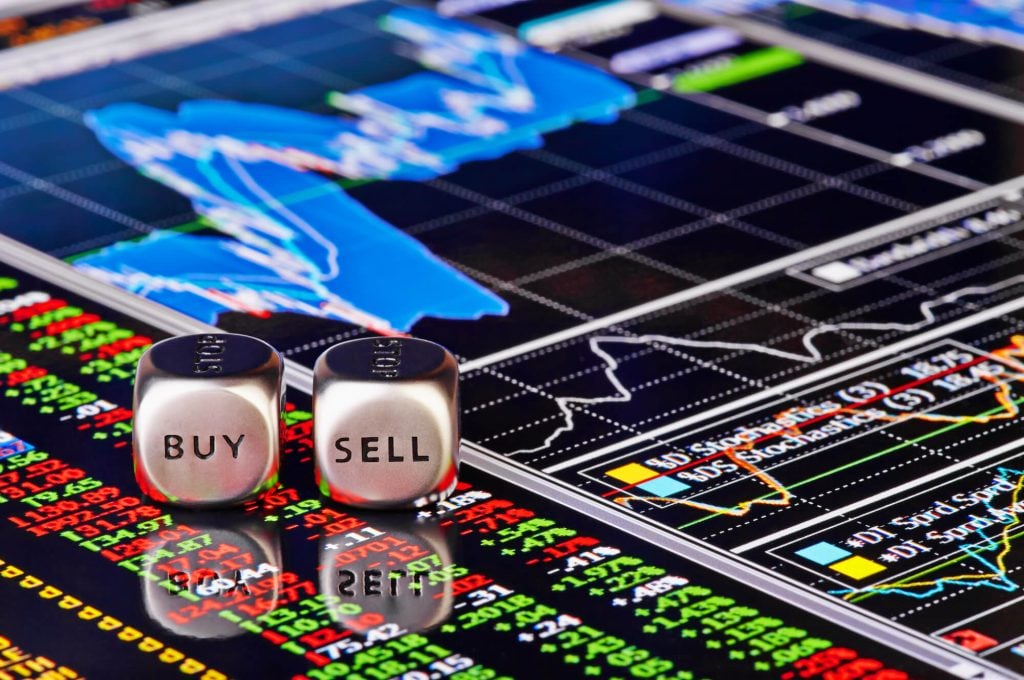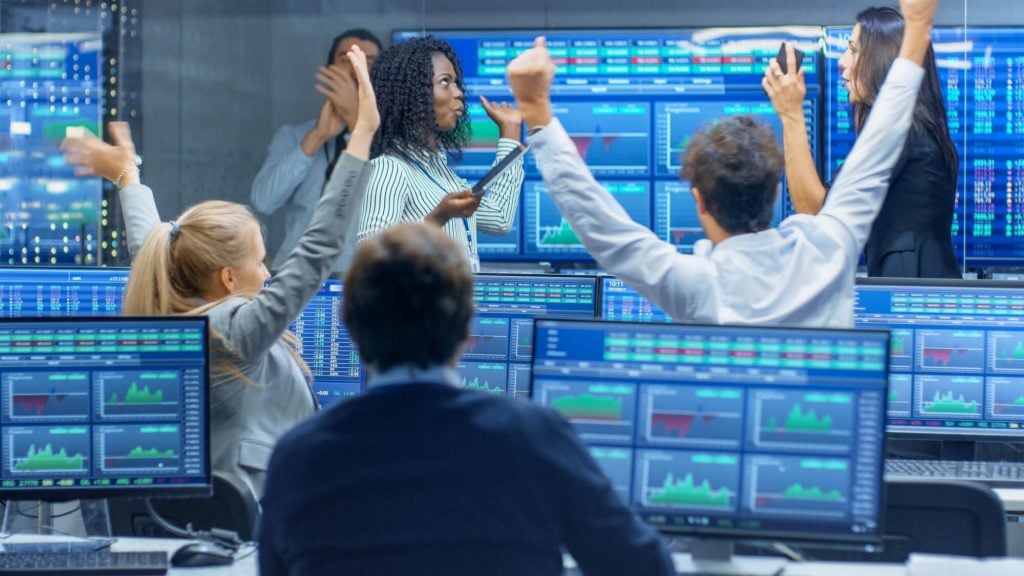We live in one of the most challenging, uncertain times in the history of the world. When we see instability, chaos, or widespread catastrophes — like the COVID-19 pandemic or political upheaval — we feel like our comfortable way of life is under threat.
When that happens to experienced investors, one of their first fears is likely in regards to the state of their portfolios. They reflect upon severe economic downturns of the past, especially long-lasting recessions, and assess whether they face the possibility of economic ruin. For inexperienced investors, the fear may cause even more anxiety.
With the fairly recent recessions of 2008 and 2020 still in memory, many wonder about the prospects for a more severe and calamitous economic slowdown or even a depression. But is the stock market going to crash again?

Will the Stock Market Crash Again?
What Causes It?
There’s no formal definition for a stock market crash. It’s very loosely explained as a mass stock-dumping event. Shareholders of companies in certain business sectors begin selling their interests in certain businesses in heavy volume, which causes share prices to dip. If the sell-off continues its downward momentum, it can result in a significant devaluation across the board, including steep declines in the major indexes and portfolio values.
Sell-offs happen for several reasons. Bad economic news is a common cause. If a company’s earnings continually undershoot expectations for a few consecutive quarters or fail to maintain worth, shareholders may bail out in groups. Sometimes, crashes happen when investors feel overconfident in a fluctuating company or business sector and create a speculative “bubble,” which can burst if those high expectations fall short and market forces decide the value potential is overinflated.
External events and news can also play a part in an economic crash. The subprime mortgage crisis of 2007 and 2008 happened when a hot real estate market encouraged lenders to offer home loans to under-qualified buyers, many of whom couldn’t handle the debt. Their defaults caused property values to plummet, as did the stock market.
Similarly, the COVID-19 pandemic brought about a series of measures that were bound to hurt a broad economic bracket — social distancing, lockdowns, and closures ground local economies to a halt. The stock market started crashing on February 20, 2020, and continued to decline until the first week of April.
The conditions and events causing a stock market crash can be utterly unforeseeable in the months leading up to the event. In other cases, business trackers may see some scattered signals in advance. Whatever the situation, the inherent risk and volatility of the market — along with fast-spreading, panicky investor jitters — dictates that a crash can happen at any time. While we look more deeply into economic downturns, it’s important to remember that the stock market has always recovered.
Downward Trends That May Signal a Broader Downturn
Investors who keep a close eye on the stock market every single day see how volatile — but ultimately resilient — the major indexes and business sectors can be. They’re more conditioned to withstand the ups and downs of the market. That’s important when sudden, sharp declines make less experienced investors nervous.
There are a few market conditions that can point to a stock market crash, but may also merely mean there will be a temporary dip in overall value and market stability. When we hear the media toss these phrases around, it might make us worried about greater disasters that may befall the market shortly. But then again, they may not.
What is a Stock Market Correction?
A correction is loosely defined as a drop of 10% or more in the price of a security, like stock shares. Corrections can happen to individual companies, entire business sectors, indexes, or non-stock investment vehicles like the bond market.
The word “correction” implies adjustment — nothing disastrous…just a need to reset the dials a bit. The vast majority of the time, that’s exactly what a stock market correction is. It doesn’t take a massively long time for a corrected stock to rebound; most corrections last only three to four months.
What is a Bear Market?
A bear market is a slightly more serious situation. It’s defined as a drop in the prices of securities by more than 20%. Bear markets usually have a more widespread effect, driving broader indexes like the S&P 500 downward by a hefty percentage. There’s a general air of negativity or pessimism among investors during a bear market, and it could (though not definitely) point to a broader recession up ahead.
Investors try to limit their risk exposure during a bear market. They may withdraw their investments in emerging, still unproven companies, and reinvest in safer long-term bets to protect their financial holdings. Bear markets happen because of overall economic downturns, rising unemployment, decreased consumer spending, dwindling business profits, or certain government actions related to the economy.
Bear markets can endure for a while — up to 20 years, in a worst-case scenario. Other times, they can last only for a few weeks or months. The COVID-19 crash ushered in a bear market in March 2020 that didn’t last for a very long time. But the ramifications of that decline made investors more circumspect about the market’s imminent post-COVID recovery.
What is a Recession?
A full-on recession is an economic downturn covering an entire region and sometimes the entire world economy. It’s defined as the state of the market after two consecutive quarters of economic decline. A recession used to be strictly defined as a drop in gross domestic product (GDP), along with other data points like a steep drop in employment.
More recently, according to the National Bureau of Economic Research (NBER), a recession is defined more broadly: It “involves a significant decline in economic activity that is spread across the economy and lasts more than a few months.”
Along with the GNP and employment figures, a recession may be seen in declines in industrial production, income, and retail sales that may last a while. The NBER is responsible for officially declaring whether a recession is in effect. Although a recession is hardly ever “welcome,” it’s also a relatively normal occurrence in the cycle of business.
What is a Depression?
Depressions are the most severe of economic declines, the kind of benchmarks most investors are terrified about in apocalyptic dread. Thankfully, depressions are rare — there’s only been one of them in the last 167 years, the so-called “Great Depression” of the 1930s.
Depression is defined as an overall drop in GDP of more than 10% in a single year. The Great Depression lasted for an entire decade, during which consumer spending nosedived, unemployment remained in double digits, and the planet faced historic levels of poverty, famine, and political instability.

Is the Market Going to Crash Again? Ways to Watch Out
While no single market condition is likely to cause a full-scale economic collapse, a combination of a few of them may be enough to jolt the market. There’s not much that you, as an individual investor, can do to stop a recession from happening, but you can keep your eye on a few current factors and trends to help guide your portfolio decisions and limit loss. These warning signs include:
Fluctuating Interest Rates
Low interest rates encourage more investment. When the federal government raises rates, then long-term yields on treasury bonds could start declining. That frightens investors.
Manufacturing and Homebuilding Cool Off
Busy manufacturing and construction sectors are key components of a successful economy. When output slows down for an extended time, that’s a possible harbinger of recession.
Unemployment Grows
Economists view sustained, high levels of unemployment as a terrible sign, as well they should. Massive unemployment arrests spending, especially in the consumer discretionary sector (houses, vacations, cars, and so forth). That drop-off can strangle the economy.
Credit Repayments Slow Down or Become Delinquent
The less customers can pay down their debt, the worse the financial sector becomes. If banks don’t have the resources to issue loans because credit customers can’t pay their bills, it puts the brakes on a lot of economic mechanisms.
Inflation Rises
Moderate inflation is good for the overall economy, as it usually points to healthy consumer spending. But when inflation takes off too quickly, that spending slows down. The Fed increases interest rates to compensate, but that makes businesses more reticent to take out loans for improvements. If that downward trend continues for a time, it’s a recession.
Is The Stock Market Going to Crash Again? What is the Outlook for the Near Future?
As every stock market professional will tell you, the risk of investing in the stock market is omnipresent. Every single transaction you make carries the chance that you could lose your entire investment. Successful investors embrace that possibility and try to control their risk exposure as much as they can, while trying to increase their portfolios’ values. But, strictly speaking, it’s not always possible to see a crash coming on the horizon.
That said, there are a few factors that wise investors should be mildly concerned about, without devolving into full-on terror about the global economy coming to a destructive end:
COVID-19
The coronavirus pandemic has already resulted in one significant market downturn. Though the market recovered, its outlook depends on getting the virus under control. If problems arise with the approved COVID-19 vaccine or distribution is delayed, the restarting of local economies — ending lockdowns and social distancing — may not happen soon enough. This could result in another steep economic drop-off.
Shaky Employment
The coronavirus also shattered the job market, causing layoffs in several companies and forcing many to work from home. This has permanently altered the employment landscape, especially for the so-called “gig economy” or temp workers. A full recovery may not happen until well after the virus is under real control.
Mortgage Defaults
Some lenders have relaxed their stances on mortgage repayments during the uncertainty of the pandemic. This could lead to another round of defaults, which could impact the stock market as severely as the subprime mortgage crisis did.
Bad Information
Along with the very real “fake news” problem, mass media is full of conflicting analysis from market experts who misinterpret, misunderstand, or flat-out lie about economic realities. When this misinformation spreads, it could result in swells of adverse economic activity that could lead to a downturn.
The good news? The stock market is historically tough. It’s been through worse. Though our fears of collapse get amplified during times of crisis, the stock market has shown a consistent ability to come back even stronger than it was before. Be watchful and make sound decisions — but never panic.

Is the Stock Market Going to Crash Again? Let Gorilla Trades Anchor Your Portfolio
Gorilla Trades has helped stock market investors survive and thrive through all sorts of tough financial landscapes since 1999. We can help you with our solid, factual research and carefully chosen stock picks. Sign up for a free trial to find out more.




